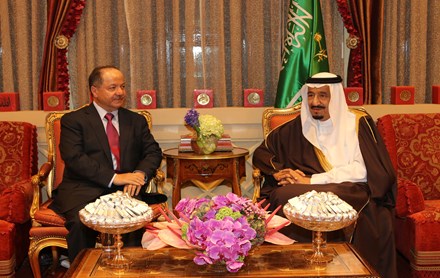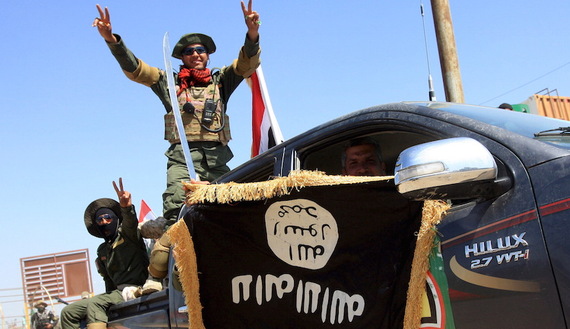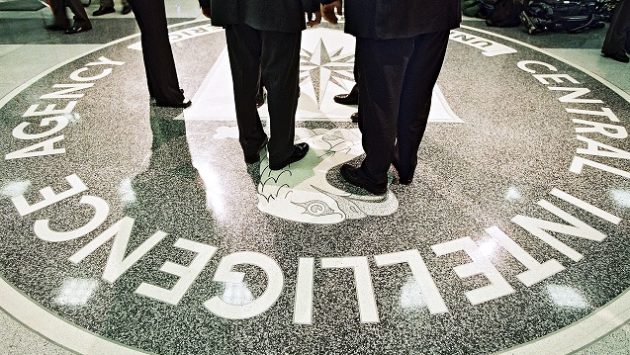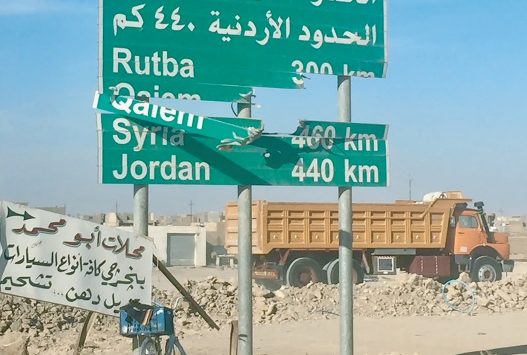In the Regional Power Struggle, has Erbil Decided to Join the Sunni Bloc?
Frzand Sherko – fikraforum
The security of the Kurdistan Region-Iraq (KRI) depends more on agreements between Erbil and Kurdistan’s neighbors than the KRI’s own security and intelligence capabilities. Whenever the regional powers surrounding the KRI have suspected that their interests are at risk, they have not hesitated to put the KRI’s security and stability in jeopardy to secure their interests. However, these regional power’s interests, increasingly at odds with one another, have begun to exacerbate the KRI’s security and internal political challenges.
Since 1992, the KRI has worked to maintain a strategic relationship with Iran. When Iraqi Kurdistan’s civil war began in late 1993, Iran played a significant role, initially by directing the Islamic Movement in Kurdistan and later through its support of both sides in the conflict – the Patriotic Union of Kurdistan (PUK) and the Kurdistan Democratic Party (KDP). Iran maintained its dual support until 1996, when it leveraged its relations to encourage both parties to maintain a political balance. Such an arrangement created stability, allowing Tehran to benefit from its economic ties with both parties and to avoid any possible threats the conflict could pose to Iranian national security.
With the power balance shift in 1996, Turkey also started investing in KRI’s security. The most visible manifestation of Turkey’s involvement came through its provision of military ground and air support to the KDP in its fight against the PKK and PUK in 1997. Meanwhile, Turkey played a peacekeeping role in the Degala border area between KDP-controlled Erbil and PUK-controlled Sulaimani provinces.
When the KRI civil war ended in 1998 with the U.S.-mediated Washington Agreement, both parties agreed to peacefully administer northern Iraq through the Kurdistan Regional Government (KRG). Yet Turkey has continued its military and intelligence presence in the KRI until now, usurping Iran’s position as the major regional influence on the KRI that it held from the 1960s to the 1980s.
The removal of Saddam’s regime opened the avenue for Jordan, Qatar, the UAE, and Saudi Arabia to shape KRI’s strategic policy. Qatar and the UAE undertook significant investment in the region’s burgeoning energy and infrastructure sectors, in part to gain better access to Baghdad. On the other hand, Saudi Arabia’s involvement in the KRI served as part of their regional policy to encircle Shiite power structures and counteract Iranian influence in Iraq, in part via the KRG.
Saudi Arabia first linked up with the Muslim Brotherhood of Kurdistan, then the Islamic Movement of Kurdistan—located in Pakistan—in 1988. Thus, Riyadh initially attempted to control the Kurdish jihadist movement, providing financial and ideological support via its intelligence services, in order to wrest it from Iran. The Saudi relationship with Kurdish nationalist parties began in the post-Saddam Hussein period. The U.S. removal of the oppressive Sunni-dominated regime in Iraq meant that Riyadh lost the easternmost gate keeper of Arab nationalism and longstanding barrier against the spread of Shiite influence on the Arab world, and so the Kurdish national movements were approached as an alternative.
Even as recently as the 2014 Daesh invasion of Mosul, Iran has demonstrated a tangible influence in Kurdish affairs. When the direction of the Daesh offensive shifted from Baghdad toward Kirkuk and Erbil in August 2014, Iran was the first regional major force to “defend” the Kurdistan region. As an Iranian army general stated, “Qasim Sulaimani saved the Kurdistan region from Daesh.” The president and prime minister of the Kurdistan region praised this “Iranian support,” which the president contrasted with Ankara’s insufficient support.
But Maliki, and now Haider Al-Abadi, have both ignored the Kurdish issue, a commonly used strategy in Baghdad. This is despite the latter’s promises of increased Sunni participation in security and military sectors and vows to solve the ongoing political and economic crises within the Kurdistan region, both promises stemming from substantial pressure by Kurds, Sunnis, and Western powers. As of yet, very little progress has been made on either front.
This policy has created the environment for the establishment of a new regional coalition of Kurdish and Sunni Arab leaders together in Erbil, a development supported by Jordan, Turkey, Saudi Arabia, and the UAE. After Daesh’s invasion of northwestern Iraq, many prominent Sunni figures and tribal leaders moved to Erbil, where they have been criticizing the Iraqi government. Arab Gulf media broadcasts Sunni Arab views from Erbil, in effect classifying it among other important Sunni-majority cities such as Istanbul, Doha, Abu Dhabi, and Amman. Even Sunni leaders threatened with prosecution from the Iraqi central government have chosen to either reside in Erbil or flee Iraq via Erbil.
The evidence suggests that this bond between Kurds and Arab Sunni powers will only deepen. The Gulf Arab countries, especially Saudi Arabia, resemble the Kurdistan region in that they are also family-ruled states that practice oligarchy and neopatrimonialism. They are also financed to a great deal by hydrocarbons resources such as oil and natural gas. Moreover, both sides rely on the spread of Madkhali Salafist (Madkhalist) ideology to suppress opposing ideologies; Kurdistan’s Salafism spread through Kurdistan recently after the Arab Spring. By supporting Erbil, Saudi Arabia has shown both a willingness to create another oligarchic familial power system in the region and a gap in Iraq to isolate Iran from Syria.
Saudi and Turkish control over Erbil would enable the Sunni powers to also exercise control over Iraq’s predominantly Sunni Anbar and Mosul provinces, helping to isolate the influence of Iraq’s Shiite authorities. Ultimately, Saudi Arabia and Turkey could bind the north, middle, and west of Iraq under the control of a 6+2 coalition (the six Gulf Arab countries plus Jordan and Turkey). This could provide a safe path for energy transportation to Turkey through Jordan and Iraq. Moreover, it would isolate the Iranian regime from the Shiites in the middle of Iraq.
Iran also recognizes that the Kurdistan region occupies a golden geostrategic location. Iran is trying to use the Kurdistan region, along with other Arab and Shiite Turkmen communities, to shore up support and eventually provide a ground corridor to transfer military forces and energy to Latakia.
Fighting erupted between Kurdish peshmerga fighters and Shiite militiamen in a disputed area of Iraqi Kurdistan where a Kurdish majority lives among Sunni Arab and Turkmen minorities, representing an attempt by Shiite forces to take control of the Iran-Iraq corridor with Syria.
This increasing focus of regional powers on Kurdistan’s front lines with Daesh has had a marked effect on Kurdistan’s domestic stability. The fight against Daesh and ongoing meetings between Barzani and high-level delegations from the United States, Iran, Turkey, the EU, and Gulf countries have marginalized the democratic process in the Kurdistan region.
In August 19, 2015, Barzani’s extended term as president of the Kurdistan region expired and a bloc of four parties in the region, two secular and two Islamic, tried to expel Barzani from the presidency. But Barzani and his party—the KDP—instead accused the Shiites and Iran of encouraging a coup. Simultaneously, KDP-affiliated media announced that Iran supported the extension Barzani’s presidency until the next parliamentary election in 2017. When Barzani’s opponents set the condition that the wide-ranging executive powers of the president must be reduced if they were to allow Barzani another term extension, the KDP rejected the condition. Barzani’s continued power has helped set the stage for an increasingly Sunni-oriented Kurdish policy. After Russia arrived in the region, the regional competition intensified, and the Sunni bloc went on the offensive.
Russia also involved itself in Kurdish politics: it took advantage of Turkey’s downing of a Russian fighter jet to solidify its geopolitical military presence in the area and threaten Turkish and Saudi interests by expressing its willingness to support the Kurdish Democratic Union Party (PYD) in Syria. The PYD is a respectable and widely-recognized Kurdish party which has significantly raised its profile in Europe and the West, especially following the fierce Kurdish resistance against Daesh in the end of 2014 in Kobane. The strongest Kurdish armed wings, the YPG and YPJ (Women’s Protection Units, the women’s counterpart of the YPG), have established themselves as a strong ally of the anti-Daesh coalition and the most effective ground force fighting the terrorist group in Syria.
Nevertheless, Sunni powers have supported extremist Turkmen Islamic groups in order to prevent the merger of the Kurdish canton of Afrin with Syria’s other two Kurdish-controlled cantons, Jazira and Kobane. In a December 2015 statement, Turkish President Recep Tayyip Erdoğan also announced that 15,000 Turkish troops and tanks were prepared to attack the PYD in Syria. A geographic union of the cantons would empower the PYD while significantly weakening the strategic reach of Turkey and Arab powers. The success or failure of Syria’s Kurds also has repercussions for Erbil: the triumph of Syrian Kurdish forces would undermine Erbil’s hand in the regional power struggle, especially in light of an ongoing strategic dispute between the PYD and the KDP.
Turkey has also deployed troops and tanks in northern Iraq and Kurdistan Region areas without the Iraqi government’s approval. According to media reports, 1,200 Turkish troops and hundreds of tanks and armored military vehicles have been deployed based on an agreement with KRG, allegedly in order to participate in an operation to liberate Mosul. Turkey still sees Mosul and northern Iraq as the “Mosul Wilayet” of the Ottoman Empire and often hints at an interest in reincorporating the area into Turkey.
Turkey’s military maneuvers have coincided with Barzani’s tour of the Gulf Arab countries, about which neither Kurdistan’s Parliament nor other political parties were well informed. Several independent Iraqi media groups and an informed source inside KDP have reported that Barzani managed to persuade the UAE leader to delay a payment of $2 billion to the UAE-headquartered Dana Gas company from the KRG Ministry of Natural Resources, following a recent decision by a tribunal of the London Court of International Arbitration.
In Saudi Arabia, the Saudi King, princes, and military officials gave Barzani an enthusiastic reception, perhaps as an attempt to show regional powers that the Kurdistan region has joined the Sunni Arab bloc. According to some sources, King Salman asked Barzani to support a self-governing Sunni region in Iraq and the passage of the national guard bill by Iraqi parliament. This would allow Iraq’s Sunni Arabs to organize a 100,000-man armed force, similar to Iraq’s current Shiite militias, under the direct control of a provincial mayor instead of the central government in Baghdad. According to available information, Saudi Arabia may hope to use the Kurds directly to fight the Shiite militias and undermine Iranian influence in northern Iraq and Syria. King Salman also allegedly assured Barzani that if successful, Riyadh will financially support the KRG, negating any need to rely on Baghdad.
A new equation is emerging that places Erbil firmly inside the Sunni bloc. This shift can change the balance of power in the region, but practically it poses a major risk to the project of an independent Kurdish state and to Kurdish national security, especially when the regional powers make the Kurdistan region a battleground for settling their disputes. Despite the Kurdish Presidency’s recent statement that the Kurdistan region will not be the part of either the Sunni or Shi’ite blocs, the president’s visit to the Gulf region hints at a different outcome, threatening retaliation from the region’s Shiite powers.
Frzand Sherko is a strategic researcher, political columnist, and directs the De-Radicalization Project in Iraqi Kurdistan.





